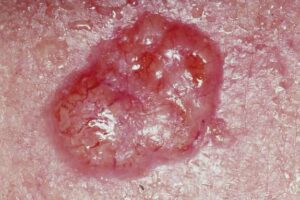
Skin cancer (basal cell carcinoma, squamous cell carcinoma, and melanoma) rates are rising. Skin cancer is the most common cancer in the U.S., with current estimates that 1 in 5 Americans will develop skin cancer in their lifetime. Unfortunately, a person can get repeat skin basal cell and squamous cell cancers. Yikes!
Interestingly, since 2015 studies are finding that a form of vitamin B3 called nicotinamide are a skin cancer preventive (chemopreventive) medication. That is, taking nicotinamide supplements reduces the risk of basal cell and squamous cell cancer development.
A recent study found that persons who already had one skin cancer removed, can significantly reduce the risk of a second skin cancer occurring if they ingest 500 mg of nicotinamide two times daily for more than one month. An overall 54% reduction in another skin cancer occurring in this group!
The biggest reduction of another skin cancer occurring was in those who had a squamous cell carcinoma removed. However the preventive effect was reduced in those who already had multiple (2 or more) skin cancers.
Excerpts from NPR: Vitamin B3 can help protect against skin cancer. Here's who may benefit
Doctors who perform skin cancer surgeries often recommend nicotinamide — which is a form of Vitamin B3 — to their patients. It's been shown to protect cells from UV radiation damage.
Now, a new study of nearly 34,000 veterans, finds this over-the-counter supplement is linked to a reduction in non-melanoma skin cancers among people who've already had skin cancer. The research was published in JAMA Dermatology.
The biggest reduction was seen among people who began taking the supplement after being diagnosed with their first skin cancer. Researchers found those who took 500 mg of nicotinamide, also known as niacinamide, twice daily, for at least one month, had a 54% reduced risk of developing another skin cancer, compared to patients who did not take the supplement.
Overall, the reduction in skin cancer risk, across all the participants, was about 14 percent. The reduction was seen in non-melanoma skin cancers, including basal cell carcinoma, which is the most common, and cutaneous squamous cell carcinoma. The biggest reduction was in squamous cell cancers.
"I was very surprised at the degree of risk reduction," says study author Dr. Lee Wheless, of Vanderbilt University Medical Center and a staff physician at the Tennessee Valley Healthcare System VA Medical Center.
"The growing body of literature suggests that we should routinely recommend nicotinamide as secondary prevention for all patients with skin cancer and that earlier initiation will have a stronger effect," Arron wrote in an editorial on the study, which was published alongside the study in JAMA Dermatology.
Arron says the supplement is widely available over the counter and has "minimal adverse effects." She says people should buy the form of the supplement that ends in "amide", rather than niacin (nicotinic acid) which is another form of B3 that does not have the same effects.
"I am going to be more rigorous in recommending it to patients, especially patients who are having their first skin cancer. I think the benefit is strongest if we start it early," Arron told NPR. She says the supplement was less effective at preventing skin cancer among participants in the study who began taking B3 after they had already been diagnosed with multiple skin cancers.
One unanswered question is whether B3 supplements are beneficial for people who have never been diagnosed with skin cancer. Arron says more research is needed. "It is certainly possible that somebody who is at higher risk for skin cancer, who's already showing signs of precancerous change in the skin, might benefit from nicotinamide," she says. "But we'll have to do those studies to see."
She says Vitamin B3 has been shown to help protect cells from UV radiation damage.
Lots of skin care products, from cleansers to serums to moisturizers include B3, which is marketed as an ingredient to help improve skin tone and texture. There may be aesthetic benefits for the skin, but Arron says it's unclear if these topical products would have any influence on cancer prevention.
This new study did not evaluate the effects of Vitamin B3 on melanoma risk, which is a type of skin cancer that has a higher risk of spreading, and can be life-threatenting when it's not identified and treated.
